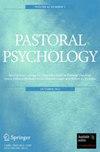Wes Anderson, Unexamined Grief, and Pediatric Chaplaincy: An Autoethnographic Reflection
IF 0.7
Q3 PSYCHOLOGY, MULTIDISCIPLINARY
引用次数: 0
Abstract
This essay combines autoethnographic narratives along with the films of U.S. film director Wes Anderson to provoke and unlock a buried grief of serving as a pediatric hospital chaplain. Anderson is one of the most well-known U.S. film directors. Even if an individual has not seen one of his eleven feature-length films, his aesthetic, eccentricity, and production design are well known and have reached meme status on social media platforms such as TikTok and Instagram. Buried within the pastel pastiche are themes of grief and trauma. The author moves through these themes alongside Anderson’s cinematic universe and offer possibilities for communal care in an Andersonian manner.
韦斯-安德森、难以名状的悲伤与儿科牧师:自述式反思
本文将自述与美国电影导演韦斯-安德森(Wes Anderson)的电影相结合,激发并揭开了作为儿科医院牧师所埋藏的悲伤。安德森是美国最知名的电影导演之一。即使一个人没有看过他的 11 部电影长片,他的美学、怪癖和制作设计也是众所周知的,并在 TikTok 和 Instagram 等社交媒体平台上达到了meme 的地位。在这些粉彩拼贴中,隐藏着悲伤和创伤的主题。作者将这些主题与安德森的电影宇宙相结合,以安德森式的方式为社区关怀提供可能性。
本文章由计算机程序翻译,如有差异,请以英文原文为准。
求助全文
约1分钟内获得全文
求助全文
来源期刊

Pastoral Psychology
Multiple-
CiteScore
1.40
自引率
25.00%
发文量
55
期刊介绍:
Pastoral Psychology, founded in 1950, is one of the most well-established and respected journals in the field of psychology and religion/spirituality. Pastoral Psychology is an international forum that publishes scholarly, peer-reviewed original articles that address varied aspects of religion and spirituality from physical, human science, and interfaith perspectives.
Historically, the word “pastoral” has referred to the care of individuals, families, and communities. Today, we additionally consider “pastoral” in terms of lived experience as it relates to embodiment, the social-political, economic, spiritual, and environmental dimensions of life.
All theoretical perspectives are welcome, as Pastoral Psychology regularly publishes articles from a variety of schools of thought, including, but not limited to, psychoanalytic and other dynamic psychologies, cognitive psychologies, experimental and empirical psychologies, humanistic psychology, transpersonal psychology, and cultural psychology. Insights from existential perspectives, intersectional theories, philosophical and theological theories, gender and queer studies, sociology, anthropology, public mental health, and cultural and empirical studies are welcome. Theoretical contributions that have direct or indirect relevance for practice, broadly construed, are especially desirable, as our intended audience includes not only academics and scholars in religion and science, but also religious and spiritual leaders, as well as caregivers, chaplains, social workers, counselors/therapists, clinical psychologists, psychiatrists, and persons interested in matters of religion/spirituality and psychology.
Pastoral Psychology welcomes scholarship and reflection from all religious and spiritual traditions. In addition to scholarly research papers, the journal welcomes thoughtful essays on a wide range of issues and various genres of writing, including book reviews and film reviews. The community of scholars represented in its pages has demonstrated that the life challenges the journal seeks to address are universally shared, yet also reflect individual social, cultural, and religious locations. The journal, therefore, welcomes submissions from scholars from around the world.
 求助内容:
求助内容: 应助结果提醒方式:
应助结果提醒方式:


